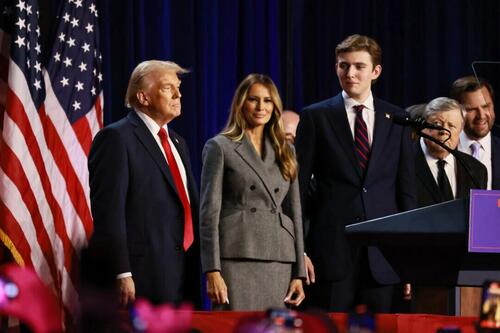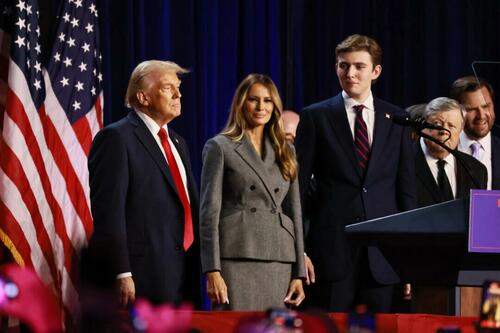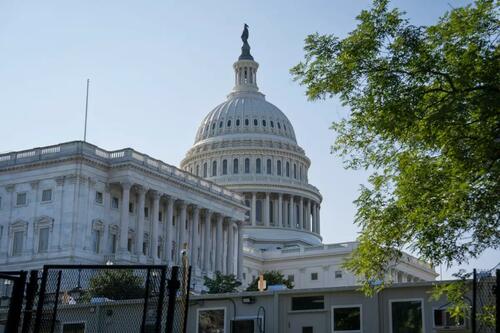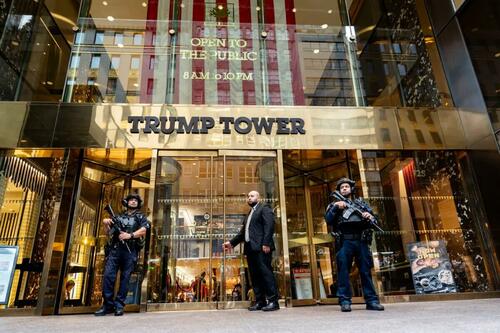Trump Returning To White House With A Bigger Mandate
Authored by Ivan Pentchoukov and Janice Hisle via The Epoch Times,
President-elect Donald Trump will reclaim the presidency next year with a wide-ranging agenda for America and a significant electoral mandate to implement his plans.
Having already won 295 Electoral College votes by the afternoon of Nov. 6, Trump was on track to capture the national popular vote and sweep all seven battleground states.
The president-elect was ahead by nearly 4.7 million votes in the national vote as of 11:16 p.m. on Nov. 6 – a 3.3 percentage point margin. He is on track to best his own national totals from 2016 and 2020, having made significant gains in broad swaths of the country, notably in safe blue states, including New Jersey, Illinois, Minnesota, New Hampshire, and Maine.
Vice President Kamala Harris, Trump’s Democratic opponent, conceded the election in a speech in Washington on the afternoon of Nov. 6. A spokesman for the Trump campaign said Harris called Trump to congratulate him earlier in the day and that “both leaders agreed on the importance of unifying the country.”
Trump’s commanding performance was buttressed by that of the Republican Party, which recaptured the U.S. Senate and was well on its way to winning the House of Representatives. As of 10:39 p.m. on Nov. 6, Decision Desk HQ projected that the GOP had a 90 percent chance to retain control of the lower chamber.
“This was a movement like nobody has ever seen before, and frankly, this was, I believe, the greatest political movement of all time,” Trump said in his victory speech.
Should Republicans win both the House and Senate, Trump will face a different Congress from the one he did in his first term that started in 2017. Now, his allies are in charge of the House Republican caucus, and all but a few of his biggest intra-party detractors have been ousted in closely-watched primary contests. In the Senate, the long-time leader of the Republicans, Sen. Mitch McConnell (R-Ky.), is stepping down and setting the stage for a leadership contest all but sure to be decided by Trump’s endorsement.
With allies in both chambers, the president-elect is less likely to run into the legislative roadblocks that characterized his first term in office.
The Senate, in particular, will be key to confirming Trump’s headline Cabinet picks, which would have seemed impossible eight years ago—particularly Robert F. Kennedy Jr., who Trump wants to task with tackling federal food and health agencies.
As the Trump transition team prepares to take the White House, Americans can expect major changes in how the government handles the economy, foreign affairs, illegal immigration, tax policy, and health care.
Trump promised to end the war in Ukraine before Inauguration Day and to launch a massive operation to deport illegal immigrants. As president, he will have the power to achieve both without the help of Congress. The same goes for rolling back the tailpipe emissions rule, which Republicans call a de-facto electric vehicle mandate.
“We’re going to help our country heal. We have a country that needs help, and it needs help very badly,” Trump said.
“We’re going to fix our borders. We’re going to fix everything about our country.”
The president-elect will have to work with Congress to deliver on some of his other promises, including ending taxes on tips, overtime pay, and Social Security income, as well as expanding the child tax credit. Other provisions in his tax plan include reducing corporate taxes to 15 percent from 21 percent, maintaining lower individual taxes and permanently expanding the $2,000 child tax credit.
On the campaign trail, Trump has floated the idea of ending taxation altogether and funding the government through tariffs on foreign goods. He has singled out China for 60 percent import tariffs and, a day before the general election, said he would threaten Mexico with a 25 percent tariff to get the southern neighbor’s help in stemming the flow of illegal immigrants.
To tackle inflation, Trump would boost domestic energy production by increasing oil drilling on public lands and offering tax breaks to oil, gas, and coal producers. He said he would double down on the deregulation agenda he embraced in the first term, with a requirement to cut 10 current regulations for each new one.
The U.S. Capitol building in Washington on Sept. 9, 2024. Madalina Vasiliu/The Epoch Times
Trump plans to bring on billionaire Elon Musk to head a new Department of Government Efficiency, which Musk has said will be key to getting inflation under control.
In addition to Musk and Kennedy, Trump’s picks for his Cabinet are likely to include some of the Republicans who challenged him in the primary election, such as North Dakota Gov. Doug Burgum and businessman Vivek Ramaswamy.
Former Rep. Tulsi Gabbard (D-Hawaii) and Kennedy’s running mate, Nicole Shanahan, are also likely at the front of the line for posts. Gabbard aligned with Trump’s opposition to so-called forever wars abroad. Shanahan is an attorney with experience in Silicon Valley.
The president-elect’s picks will be closely watched because many of the people he selected during his first term ended up turning against him, especially in the aftermath of the contested 2020 election.
Trump challenged the outcome of the 2020 race in seven battleground states and refused to bow out of the race until Jan. 6, 2021, when a crowd of his supporters clashed with police on Capitol grounds and breached the building while Congress certified the results of the election.
After Trump left the White House on Jan. 20, 2021, the Democrats used the events of Jan. 6 to impeach Trump in the House of Representatives, making him the first president to face two impeachments. The Senate exonerated Trump in both cases.
A Trump supporter waves a giant flag outside the White House on Nov. 6, 2024. Former President Donald Trump on Nov. 6 won a sweeping victory in the 2024 presidential election. Daniel Slim/AFP via Getty Images
The impeachment was only the first in a series of unprecedented events that ultimately led to Trump’s comeback four years later. Trump was banned from several social media platforms, had his residence raided by federal agents, faced several indictments on the state and federal levels, posed for a mugshot taken at a Georgia jail, survived two assassination attempts, and went up against two Democratic Party nominees in a single election.
In the face of the challenges, he ran a successful campaign, took control of the Republican National Committee, beat GOP fundraising records, and made gains with parts of the electorate long-aligned with the Democrats, including Hispanics and young men.
“God spared my life for a reason,” Trump said during his victory speech on election night, referring to the assassination attempts on his life.
Trump’s 2024 campaign leaned into interviews with internet influencers, including Joe Rogan, the Nelk Boys, and Logan Paul. The strategy appears to have paid off in attracting young men. Exit polls by Edison Research show Trump gaining 6 percentage points with the group compared to 2020.
One campaign staple remained unchanged from Trump’s first run for the White House: the rallies. The president-elect held 119 of these signature events during the 2022–2024 campaign season. As he did in 2016 and 2020, he held the final rally in Grand Rapids, Michigan.
Trump rallies have evolved over the years to include elements of entertainment and visual aids. Some of the final rallies of the 2024 campaign, including a jam-packed rally at Madison Square Garden in New York City, included live opera performances.
In Trump’s speeches, social media messages, and campaign ads, he focused on the three crises facing the Biden–Harris administration: inflation, the border crisis, and, more recently, the wars in Ukraine and Israel. The current administration has managed to get inflation under control, but illegal border crossings have remained stubbornly high and the wars in Ukraine and the Middle East appear to be spiraling out of control.
Trump has promised to end the war in Ukraine during the transition period between November and January. He has repeatedly said his top priority on the first day in office would be to seal the southern border with Mexico.
Path to Nomination
To win the 2024 Republican nomination, Trump defeated more than a dozen contenders without participating in any of the four Republican presidential debates.
Several contenders jumped into the race early in 2023 after Trump declared his candidacy in November 2022. By the fall of 2023, the field of candidates began to shrink. Trump’s former vice president, Mike Pence, withdrew from the race in October 2023. Sen. Tim Scott (R-S.C.) dropped out the following month.
Trump comfortably won the Iowa caucuses on Jan. 15, nearly 30 percentage points ahead of his nearest competitor, Florida Gov. Ron DeSantis. Ohio biotech entrepreneur Vivek Ramaswamy dropped out immediately after the caucuses. DeSantis quit the race several days later.
Trump’s former ambassador to the United Nations, Nikki Haley, a former governor of South Carolina, hung on until March before dropping out.
Republican presidential nominee and former President Donald Trump speaks during a campaign rally at the PPL Center in Allentown, Pa., on Oct. 29, 2024. Arjun Singh/The Epoch Times
From Trump Tower to the White House
Now 78 years old and making his third presidential run, Trump started his rise to fame and fortune in his native New York. After leaving the White House in 2021, he now lives in Florida at his Mar-a-Lago estate in Palm Beach.
Following in the footsteps of his father, Fred Trump, he built an international real estate empire. Donald Trump became a household name during the 2000s while starring in the reality TV series “The Apprentice.” During the show, he coined his famous phrase “You’re fired!” while axing a contestant at the end of each show. Trump also has authored several books, including 1987’s “The Art of the Deal.”
Before he became the standard-bearer for a revamped version of the Republican Party, Trump had changed his political affiliation several times.
In 2004, he told CNN, “In many cases, I probably identify more as Democrat.”
He said it seemed to him that the economy was healthier under Democrats. Trump switched to the Republican Party in 2011, records show.
In 2014, Trump took steps toward running as governor of New York but decided against it. The following year, he pursued politics in earnest, ending years of speculation about a Trump presidential run.
On June 16, 2015, he and his wife, Melania Trump, rode down an escalator at Trump Tower in Manhattan to announce his candidacy.
That day, he debuted his “Make America Great Again” slogan, echoing the “Let’s Make America Great Again” phrase that Republican Ronald Reagan used during his successful 1980 presidential campaign.
In 2016, Trump became the unlikely victor of the presidential election, making him the first U.S. president with no prior experience in public office or as a military commander.
Security in front of Trump Tower in New York City on Sept. 26, 2024. Samira Bouaou/The Epoch Times
Throughout the campaign season, polls showed Trump trailing Democrat Hillary Clinton, a longtime politician and wife of former President Bill Clinton. That pattern continued in 2020 and 2024, with Trump consistently outperforming polls.
During his presidency, Trump fought a barrage of political attacks that began immediately after he took the oath of office in 2017.
He became the third U.S. president to be impeached, and he stands alone as the sole president to be impeached twice. The Senate acquitted him both times.
During the first two years of his term, the president and dozens of people close to him were ensnared in the so-called Russian-collusion inquiry headed by special counsel Robert Mueller. The special counsel concluded the investigation with a report that did not document any evidence of collusion.
In the final year of his presidency, Trump grappled with the COVID-19 pandemic and a summer of race riots as he campaigned for reelection. His Democratic opponent was Joe Biden, a longtime senator who served as vice president under President Barack Obama.
A Trump White House statement said his presidential accomplishments included a strong economy with low interest rates, “massive deregulation” to spur business growth, and taking “historic action to promote peace in the Middle East.” He was nominated for a Nobel Peace Prize for his efforts in the Middle East.
Trump was born in New York City on June 14, 1946; his parents, Fred Trump and Mary Trump, née MacLeod, had five children. Trump himself has five children through three marriages, and 10 grandchildren.
He received his education at the New York Military Academy, a private boarding school, followed by Fordham University and the Wharton School of Finance at the University of Pennsylvania, where he earned a bachelor’s degree in economics.
Tyler Durden
Fri, 11/08/2024 – 15:30






